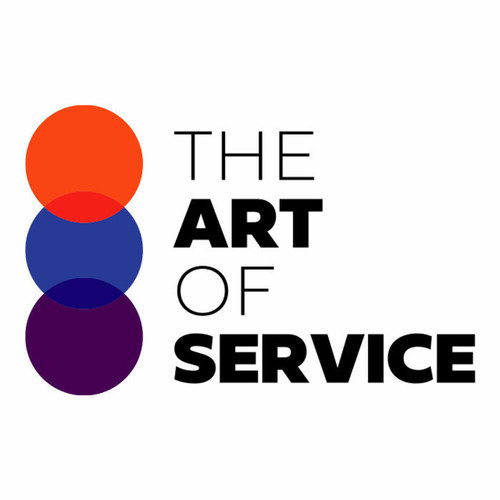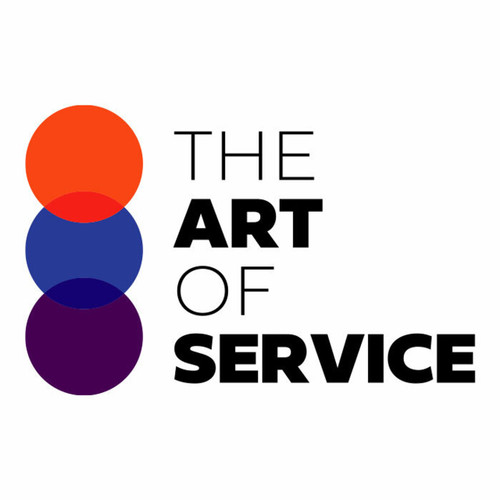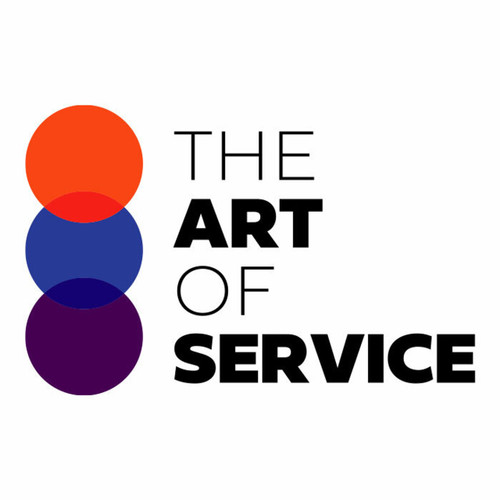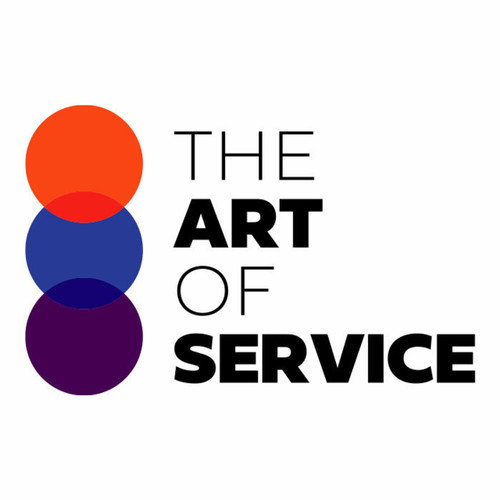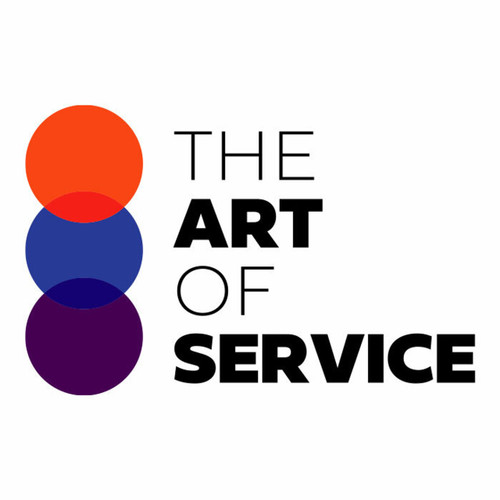Are you tired of struggling with project evaluations and not seeing the results you want within the first 90 days? Look no further, because our Project Evaluation and First 90 Days Evaluation Knowledge Base is here to revolutionize your approach.
With an extensive dataset containing 1555 prioritized requirements, solutions, benefits, results, and case studies, our knowledge base helps you ask the most important questions to get results quickly and effectively.
No longer will you waste time and resources on irrelevant evaluations; our knowledge base ensures that you are focusing on what truly matters - urgency and scope.
Our product stands out from competitors and alternatives with its in-depth research and comprehensive coverage of all aspects of project evaluation and first 90 days.
It is designed specifically for professionals like you, making it the perfect tool to enhance your performance and drive success.
This affordable DIY alternative allows you to take control of your project evaluations without the need for expensive consultants or software.
Our product is easy to use and provides a detailed overview of specifications and product type – making it suitable for all industries and projects.
But that′s not all – our knowledge base offers even more benefits.
It includes comparisons between product types and semi-related products, giving you a complete understanding of how our product stands against others in the market.
Our research on project evaluation and first 90 days has been proven to deliver results for businesses of all sizes, saving them time and money.
Don′t just take our word for it – the benefits of our knowledge base have been tested through real-life examples and case studies.
Our product has been praised by professionals and businesses alike for its effectiveness and efficiency.
Start taking charge of your project evaluations today with our Project Evaluation and First 90 Days Evaluation Knowledge Base.
Say goodbye to the uncertainty and stress of evaluations and hello to success and growth.
With a one-time cost and no hidden fees, our product is a cost-effective investment that brings endless value to your business.
Don′t hesitate, try it out for yourself and experience the pros and cons of our knowledge base.
You won′t regret incorporating it into your evaluation process and witnessing the incredible results it delivers.
Say goodbye to mediocre evaluations and hello to success with our Project Evaluation and First 90 Days Evaluation Knowledge Base.
Discover Insights, Make Informed Decisions, and Stay Ahead of the Curve:
Key Features:
Comprehensive set of 1555 prioritized Project Evaluation requirements. - Extensive coverage of 158 Project Evaluation topic scopes.
- In-depth analysis of 158 Project Evaluation step-by-step solutions, benefits, BHAGs.
- Detailed examination of 158 Project Evaluation case studies and use cases.
- Digital download upon purchase.
- Enjoy lifetime document updates included with your purchase.
- Benefit from a fully editable and customizable Excel format.
- Trusted and utilized by over 10,000 organizations.
- Covering: Project Evaluation, Interpersonal Relationships, Implementation Plans, Training And Development, Strategy Evaluation, Mentoring Opportunities, Conflict Resolution Models, Team Performance Analysis, Collaboration Tools, Market Evaluation, Measured Success, Learning Objectives, Quality Standards, Personal Strengths, Organizational Transition, Vision Setting, Emotional Intelligence, Team Motivation, Adoption Support, Organizational Culture, Conflict Management, Goal Setting, Succession Planning, Managing Stress In The Workplace, Change Readiness, Meeting Deadlines, Cultural Sensitivity, Organizational Goals, Job Board Management, Feedback Mechanisms, Work Life Integration, Project Deadlines, Stress Management, Problem Prevention, Efficient Decision Making, Cultural Competence, Setting Expectations, Performance Metrics, Cost Saving Strategies, Process Capabilities, Monitoring And Reporting, Cross Functional Collaboration, Workload Management, First 90 Days Evaluation, Data Intrusions, Coaching And Mentoring, Problem Solving Skills, Feedback And Recognition, Customer Needs Analysis, Communication Channels, Social Media Presence, Managing Up, Performance Feedback, Collaboration Skills, Change Culture, Market Trends, Budget Management, Performance Planning, Organization Transitions, Team Goals, Leveraging Strengths, Employee Recognition Strategies, Areas For Improvement, Decision Making, Communication Styles, Organizational Impact, Cost Evaluation, Innovation Strategies, Critical Thinking, Accountability Frameworks, Inclusion And Diversity, Performance Improvement, Project Planning, Skill Assessment, Reward And Recognition, Performance Tracking, Company Values, Negotiation Skills, Systems And Processes, Change Evaluation, Setting Boundaries, Risk Management, Career Growth Opportunities, Diversity Initiatives, Resource Allocation, Stress Reduction Techniques, Long Term Goals, Organizational Politics, Team Collaboration, Negotiation Tactics, Consistent Performance, Leadership Style, Work Life Balance, Team Cohesion, Business Acumen, Communicating With Stakeholders, Positive Attitude, Ethical Standards, Time Off Policies, Empathy And Understanding, Self Reflection, Strategic Thinking, Performance Goals, Flexibility And Adaptability, Creative Thinking, Timely Follow Up, Team Dynamics, Individual Goals, Feedback Implementation, Skills Evaluation, Conflict Avoidance, Leadership Development, Customer Satisfaction, Create Momentum, Onboarding Process, Technical Competence, Employee Engagement, Decision Making Models, Sales Techniques, Self Awareness, Global Perspective, Process Improvement, Time Management, Customer Service Strategies, Conflict Resolution, Building Trust, Tools And Technology, Risk Assessment, Problem Identification, Facing Challenges, Innovative Ideas, Ethical Considerations, Success Metrics, Employee Evaluation, Career Development, Learning From Failure, Cross Cultural Competence, Performance Reviews, Goals And Objectives, Personal Branding, Change Management, Process Materials, Team Performance Evaluation, Budgeting Skills, Time Constraints, Role Responsibilities, Decision Making Processes, Industry Knowledge, Career Advancement, Company Culture, Customer Interactions, Customer Retention, Data Analysis, Performance Evaluation Metrics, Creativity And Innovation, Constructive Criticism, Quality Control, Tracking Progress
Project Evaluation Assessment Dataset - Utilization, Solutions, Advantages, BHAG (Big Hairy Audacious Goal):
Project Evaluation
Project Evaluation is a process of assessing the success and effectiveness of a project. Organizations may use different types of evaluations, such as formative or summative, and they may conduct them on a regular basis to track progress and improve performance.
1. The organization currently uses a performance evaluation every 90 days to assess employee progress and performance.
- Provides frequent feedback to employees.
- Allows for timely identification of areas for improvement.
2. The organization also conducts quarterly project evaluations to review the success and impact of projects.
- Helps identify best practices and areas for improvement.
- Enables the organization to make necessary adjustments for future projects.
3. In addition, the organization uses a 360-degree evaluation to gather feedback from multiple sources on employee performance.
- Provides a well-rounded view of an employee′s strengths and weaknesses.
- Allows for constructive feedback from peers, managers, and subordinates.
4. The organization also conducts customer feedback surveys to evaluate the satisfaction and loyalty of clients.
- Helps identify areas for improvement in the products or services offered.
- Allows the organization to make necessary changes to better meet customer needs.
5. The organization uses a results-based evaluation system to measure the outcomes and impact of its projects.
- Provides objective data on the effectiveness and success of projects.
- Can be used to demonstrate the organization′s impact to stakeholders and donors.
CONTROL QUESTION: What type of evaluation does the organization currently use and how frequently?
Big Hairy Audacious Goal (BHAG) for 10 years from now:
In 10 years, our organization will have successfully implemented a robust and comprehensive project evaluation system that is utilized for every project and program we undertake. This evaluation system will be based on the principles of continuous improvement and will involve all stakeholders in the process.
We will use a multi-method approach to evaluation, including qualitative and quantitative data collection methods, such as surveys, interviews, focus groups, and performance metrics. The data collected will be analyzed using cutting-edge technology and best practices in evaluation.
Our organization will commit to conducting evaluations at every stage of the project cycle, from planning to implementation and follow-up. This will allow us to identify strengths and weaknesses early on and make necessary adjustments in a timely manner.
Most importantly, our organization will prioritize the use of evaluation results to inform decision-making and improve our overall performance. We will create a culture that values evaluation and sees it as an essential tool for achieving our mission and goals.
Our ultimate goal is to become a leader in project evaluation, both within our organization and in the larger field. We aim to continuously raise the bar and set new standards for effective and meaningful evaluation practices.
Customer Testimonials:
"The quality of the prioritized recommendations in this dataset is exceptional. It`s evident that a lot of thought and expertise went into curating it. A must-have for anyone looking to optimize their processes!"
"Downloading this dataset was a breeze. The documentation is clear, and the data is clean and ready for analysis. Kudos to the creators!"
"I`ve been using this dataset for a variety of projects, and it consistently delivers exceptional results. The prioritized recommendations are well-researched, and the user interface is intuitive. Fantastic job!"
Project Evaluation Case Study/Use Case example - How to use:
Case Study: Project Evaluation for XYZ Organization
Client Situation:
XYZ Organization is a medium-sized non-profit organization that works towards improving access to education for underprivileged children in developing countries. The organization operates in multiple countries and partners with local schools and communities to provide resources and support for children. Recently, the organization has been facing funding challenges and a saturation in the number of children being reached. As a result, they have decided to conduct a project evaluation to assess their existing programs and identify any areas for improvement.
Consulting Methodology:
The consulting process for project evaluation at XYZ organization followed a systematic approach to gather data, analyze it, and recommend solutions. The methodology involved four key steps: scoping, data collection, analysis, and presentation of findings.
1. Scoping:
In the initial scoping phase, the project evaluation team worked closely with the senior management team at XYZ organization to understand their objectives and expectations from the evaluation. The team also studied the organization′s existing policies, procedures, and strategies related to program implementation and evaluation.
2. Data Collection:
The consulting team identified various sources of data, both internal and external, to conduct a comprehensive evaluation. Internal data sources included program reports, financial statements, and previous evaluations. External sources of data included surveys with stakeholders such as staff, partner schools, and community members, as well as desk research on best practices in the education sector.
3. Analysis:
The collected data was analyzed using both qualitative and quantitative methods. The qualitative analysis involved reviewing program performance against pre-defined indicators and conducting stakeholder interviews to gather feedback and suggestions. The quantitative analysis, on the other hand, involved statistical techniques such as correlation analysis to identify patterns and trends in the data.
4. Presentation of Findings:
Based on the analysis, the consulting team presented their findings and recommendations to the senior management team at XYZ organization. The recommendations were prioritized based on their feasibility and potential impact on the organization′s objectives.
Deliverables:
The project evaluation deliverables included a detailed report highlighting the findings, recommendations, and an action plan for implementation. The report also included a comprehensive visual dashboard that showcased key performance indicators (KPIs) such as program reach, impact, and efficiency. Additionally, the consulting team provided training to the staff on how to use the KPI dashboard for ongoing monitoring and evaluation.
Implementation Challenges:
The project evaluation faced several challenges during its implementation. These included a lack of data management systems at the organization, inadequate resources, and resistance to change from some stakeholders. However, these challenges were addressed by working closely with the organization′s staff and providing training on data collection and analysis.
KPIs:
The project evaluation team identified the following KPIs to measure the success of the evaluation:
1. Program reach: The number of children reached through the organization′s programs in the past year.
2. Impact: The change in academic performance and attendance of children in partner schools after receiving support from the organization.
3. Efficiency: The cost per child served by the organization.
Management Considerations:
Based on the evaluation findings, the organization′s senior management team decided to make several changes to their existing policies and procedures. These included strengthening their data management systems, implementing a more streamlined monitoring and evaluation process, and prioritizing programs with high impact and efficiency. The team also proposed creating partnerships with local organizations to expand their reach and reduce costs.
Conclusion:
In conclusion, the project evaluation at XYZ organization proved to be a valuable exercise in assessing the effectiveness and impact of their programs. The systematic approach and use of both qualitative and quantitative methods ensured the reliability and validity of the findings. The recommended changes were implemented, resulting in improved program outcomes and an increase in the number of children reached. The organization now conducts project evaluations every two years to continuously monitor and improve their programs.
Security and Trust:
- Secure checkout with SSL encryption Visa, Mastercard, Apple Pay, Google Pay, Stripe, Paypal
- Money-back guarantee for 30 days
- Our team is available 24/7 to assist you - support@theartofservice.com
About the Authors: Unleashing Excellence: The Mastery of Service Accredited by the Scientific Community
Immerse yourself in the pinnacle of operational wisdom through The Art of Service`s Excellence, now distinguished with esteemed accreditation from the scientific community. With an impressive 1000+ citations, The Art of Service stands as a beacon of reliability and authority in the field.Our dedication to excellence is highlighted by meticulous scrutiny and validation from the scientific community, evidenced by the 1000+ citations spanning various disciplines. Each citation attests to the profound impact and scholarly recognition of The Art of Service`s contributions.
Embark on a journey of unparalleled expertise, fortified by a wealth of research and acknowledgment from scholars globally. Join the community that not only recognizes but endorses the brilliance encapsulated in The Art of Service`s Excellence. Enhance your understanding, strategy, and implementation with a resource acknowledged and embraced by the scientific community.
Embrace excellence. Embrace The Art of Service.
Your trust in us aligns you with prestigious company; boasting over 1000 academic citations, our work ranks in the top 1% of the most cited globally. Explore our scholarly contributions at: https://scholar.google.com/scholar?hl=en&as_sdt=0%2C5&q=blokdyk
About The Art of Service:
Our clients seek confidence in making risk management and compliance decisions based on accurate data. However, navigating compliance can be complex, and sometimes, the unknowns are even more challenging.
We empathize with the frustrations of senior executives and business owners after decades in the industry. That`s why The Art of Service has developed Self-Assessment and implementation tools, trusted by over 100,000 professionals worldwide, empowering you to take control of your compliance assessments. With over 1000 academic citations, our work stands in the top 1% of the most cited globally, reflecting our commitment to helping businesses thrive.
Founders:
Gerard Blokdyk
LinkedIn: https://www.linkedin.com/in/gerardblokdijk/
Ivanka Menken
LinkedIn: https://www.linkedin.com/in/ivankamenken/



